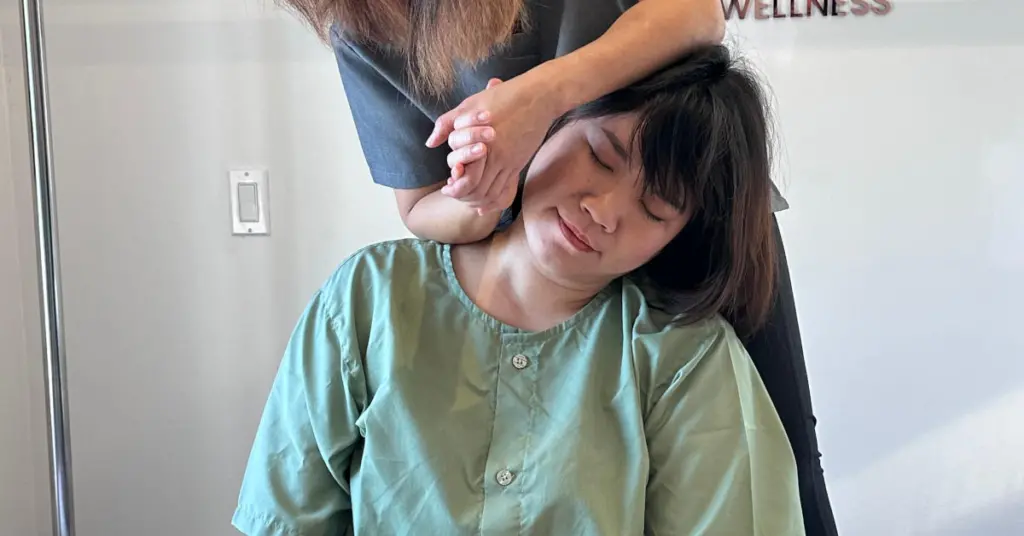Neck and shoulder tension is a common ailment in our modern, screen-dominated world. Many suffer almost constantly from discomfort or even debilitating pain in these areas. It could be due to poor posture, long work hours at the computer, or emotional stress. Whatever the cause, the pain is real, and its effects can be far-reaching. One highly effective method for addressing this tension and bringing the body back into balance is Thai massage.
Comprehensive Understanding of Thai Massage
Thai massage, also known as Nuad Boran, is an ancient form of bodywork with roots in Thailand. It marries elements of yoga, acupressure, and deep stretching to encourage relaxation and healthy energy flow throughout the body. Unlike many other types of massage, Thai massage is performed on a mat on the floor. This setting allows the practitioner to use their entire body to apply pressure and guide the client through a series of movements.
Thai massage has an integrated approach, providing a holistic healing experience. The therapist manoeuvres the client’s body in a sequence of postures akin to yoga, while applying pressure on energy lines and points. The interaction between the client and the therapist is dynamic and therapeutic, with each session being a unique blend of stretches, palpations, and compressions.
The Multitude Benefits of Thai Massage for Neck and Shoulder Tension
Thai massage has gained reputation worldwide for its ability to effectively alleviate muscle tension and improve overall health. For neck and shoulder tension in particular, Thai massage can provide many benefits:
-
Improved Blood Circulation: In a Thai massage session, the practitioner uses deep pressure and stretching techniques to stimulate blood circulation in the neck and shoulder muscles. This increased blood flow can reduce inflammation, release built-up tension, and aid in the body’s natural healing process.
-
Enhanced Range of Motion: Thai massage incorporates stretching movements to improve flexibility and range of motion in the neck and shoulder joints. This can ease stiffness and decrease the risk of future tension and injury.
-
Relaxation on Multiple Levels: Thai massage is not only physically therapeutic but also mentally soothing. The rhythm of the movements and focus on deep breathing can help relieve stress and anxiety, often associated with neck and shoulder tension.
-
Trigger Point Release: Trigger points, or muscle knots, are hypersensitive areas within the muscles that can cause radiating pain. Thai massage techniques can effectively target and break down these trigger points, releasing tension and providing relief from the associated discomfort.
-
Posture Correction: Poor posture is a major contributing factor to neck and shoulder tension. Thai massage can help correct postural imbalances through targeted stretching and lengthening of muscles, promoting better alignment and reducing strain on the affected areas.
Specialized Techniques Used in Thai Massage for Neck and Shoulder Tension
Thai massage employs a range of techniques specifically designed to target neck and shoulder tension, promote relaxation, and improve well-being. These include:
-
Pressure Point Massage: In this technique, the therapist applies pressure to specific points along the neck and shoulder muscles to stimulate energy flow and relieve tension. It’s especially effective in addressing trigger points and releasing muscle knots.
-
Stretching Movements: Thai massage incorporates a variety of stretching movements to lengthen and loosen tight muscles. These stretches can target the neck and shoulder regions, providing relief from tension, and increasing flexibility and mobility.
-
Sen Lines Activation: Sen lines are energy pathways that run throughout the body. Thai massage focuses on stimulating these lines to restore balance, alleviate tension, and improve overall well-being. By activating specific sen lines associated with the neck and shoulders, Thai massage therapists can facilitate tension release and enhance overall wellness.
-
Herbal Compresses: Some Thai massage sessions may include the application of herbal compresses to the neck and shoulder area. These compresses contain a mix of herbs with therapeutic properties that soothe muscle tension, reduce inflammation, and promote relaxation.
Maximizing the Benefits of Thai Massage: Tips and Tricks
To derive maximum benefit from a Thai massage session for neck and shoulder tension, consider the following tips:
-
Open Communication: Make sure to inform your therapist about any specific areas of tension or discomfort you’re experiencing. This will allow them to customize the massage, providing targeted relief.
-
Hydration: Keep yourself well-hydrated before and after your Thai massage session. Water helps flush out toxins released during the treatment and aids in the body’s natural healing process.
-
Maintaining Good Posture: Alongside Thai massage, make a conscious effort to maintain good posture throughout the day. Good posture prevents the recurrence of neck and shoulder tension.
-
Self-Care Practices: Prolong the effects of Thai massage with regular self-care practices. These can include stretching exercises, hot baths, self-massage, or even meditation.
Conclusion
Thai massage offers a holistic approach to managing neck and shoulder tension. By blending stretching, acupressure, and deep pressure techniques, it can help increase blood circulation, improve range of motion, provide physical and emotional relaxation, release trigger points, and correct postural imbalances. By integrating Thai massage into your wellness routine and adopting healthy habits, you can effectively handle and overcome the discomfort caused by neck and shoulder tension, leading to a healthier, more balanced lifestyle.

Ready to ease neck and shoulder tension? Book your Thai massage session today!
Key Takeaways
- Thai massage is an effective solution for addressing neck and shoulder tension.
- Thai massage combines elements of yoga, acupressure, and deep stretching to promote relaxation and healthy energy flow.
- Thai massage improves blood circulation, enhances range of motion, promotes relaxation, releases trigger points, and corrects posture.
- Specialized techniques used in Thai massage for neck and shoulder tension include pressure point massage, stretching movements, sen lines activation, and herbal compresses.
- To maximize the benefits of Thai massage, communicate with the therapist, stay hydrated, maintain good posture, and practice self-care.
FAQ
What is Thai massage?
Thai massage, also known as Nuad Boran, is an ancient form of bodywork that combines yoga, acupressure, and deep stretching. It is performed on a mat on the floor and involves the practitioner using their entire body to apply pressure and guide the client through movements.
How does Thai massage help with neck and shoulder tension?
Thai massage improves blood circulation, enhances range of motion, promotes relaxation, releases trigger points, and corrects posture. It uses techniques such as pressure point massage, stretching movements, sen lines activation, and herbal compresses to address tension in the neck and shoulder areas.
Can Thai massage relieve muscle knots?
Yes, Thai massage techniques can effectively target and break down muscle knots, also known as trigger points. This helps release tension and provides relief from associated discomfort.
What should I do to maximize the benefits of Thai massage?
To maximize the benefits of Thai massage, communicate with the therapist about your specific areas of tension or discomfort. Stay hydrated before and after the session, maintain good posture throughout the day, and incorporate self-care practices such as stretching exercises, hot baths, self-massage, or meditation into your routine.

